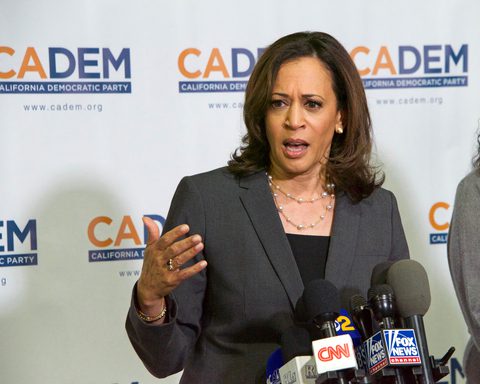This past Thursday night, more than 35,000 thousand people reportedly logged onto a Zoom put together by Jewish Women for Kamala Harris and the Jewish Democratic Council of America.
They were reminded by none other than Barbra Streisand, that Kamala Harris “married a nice Jewish guy.” Nevada’s Jewish US Senator Jackie Rosen, said Harris and her running mate Tim Walz would “build a safer country for the world and for the Jewish people.” The organizers of the event said Harris and Walz “have our backs, and Jewish women want to show that we have theirs.”
Well, it’s not a question of backs, and it’s not a question of who Kamala Harris married, it’s a question of behinds. Who will be behind her Middle East policy in her administration?
Full disclosure, I’m no foreign policy authority nor Middle East expert. I don’t have a fancy PhD in foreign affairs, not that there’s anything wrong with that. I’m just a guy who reports the information I have in front of me.
So, I’m going to report on what I see coming out of the Harris camp about what the US-Israel relationship could look like in her administration. You must decide if it jives with what you believe is the correct US policy toward Israel.
So let’s start with Israeli Prime Minister Benjamin Netanyahu’s address to Congress last month. Harris dissed him by not showing up. She had a previous engagement with her college sorority.
We’ve also heard her express sympathy for some of the anti-Israel demonstrators who’ve been permitted to take over the campuses of American universities.
Okay, so she’s not a Zionist as her current boss, Joe Biden, has repeatedly said he is.
But more indicative of her stance on Israel than these one-off, piss-offs of segments of the American Jewish community, are the people who are in her inner advisory circle.
There are two key people Harris will likely rely heavily upon for her foreign policy advice, because unlike Joe Biden, she has no experience in foreign relations, let alone the complexities of the Middle East.
The first person is Philip Gordon, Harris’ overall foreign policy advisor since her 2020 presidential campaign. He coordinated Middle East regional policy during President Barack Obama’s second term.
Gordon definitely leans toward accommodation with Iran. He was upset when Donald Trump ordered the assassination of Iranian Major General Qasem Soleimani, saying it needlessly antagonized the Iranian regime. Some Republicans in Congress have also questioned his ties to a pro-Iranian official in the Pentagon.
Gordon could end up as Harris’ national security adviser.
The second person to assess is Ilan Goldenberg, appointed just this past week as Harris’ liaison to the Jewish community. He has been her advisor on Middle East issues and will continue to “advise the campaign on issues related to the US-Israel relationship, the war in Gaza and the broader Middle East.
When it comes to the America’s role in the Middle East, Goldenberg and Gordon are of like mind. They are both skeptical of American military and economic power to achieve foreign policy goals. They are both strong advocates of the so-called two state solution. They both want the United States to rejoin the Iran nuclear deal.
Goldenberg’s appointment this week was praised by J-Street, the left of center, American-Israeli lobbying group. J-Street said it’s “a great pick by the Harris-Walz campaign for this sensitive assignment.”
Americans for Peace Now, whose declared mission is to press for an Israel-Palestinian peace agreement resulting in two states based on the 1967 borders, said it was “glad to know that there is someone advising the campaign that has not only [Goldenberg’s] knowledge and experience, but also empathy and sense of justice. Great choice.”
When he was director of the Middle East Security Program at the Center for a New American Security, Goldenberg authored several articles for Slate, revealing his views on US-Israel relations.
He was against moving the US embassy in Israel from Tel Aviv to Jerusalem. He said it “gives the Israelis a huge political victory and gives the Palestinians nothing.” He was also against US recognition of Israeli sovereignty over the Golan Heights.
Clearly, Goldenberg and Gordon, at least where Israel is concerned, lean toward Barack Obama’s way of dealing with Israel.
Joe Biden, once upon a time, believed he could get Israel to be diplomatically pliable by bear-hugging the Jewish state, by drawing it close, to try to make it feel secure so it could take risky moves. He tried to convince Obama of that approach, to no avail.
It sure doesn’t look like Kamala Harris and Bibi Netanyahu will be huggy-huggy if she’s elected president.
As far as the greater Middle East is concerned, there are lots of facets to the role America plays in that volatile part of the world.
Will Harris overrule her advisers who want to re-engage Iran on a nuclear weapons deal in exchange for easing sanctions? Will she view Saudi Arabia as an ally? What role will the American armed forces continue to play in that region?
All important issues for a President Harris to tackle. But for me, the most important issue is a Harris administration’s relationship with our crucial ally, Israel.
If it is for you as well, then before you decide who to vote for you need to have a good understanding of who Harris will be leaning on for advice and guidance.
Barbra Streisand the great American singer, actress and director, is humming happy days are here again with the anointing of Kamala Harris as the Democrat presidential candidate
And Friend Without Benefits, the not so great, foreign affairs non-expert says, it’s important to know all the info before you go…to vote.

